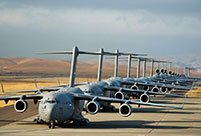 If you like autumn, put your hands in the air!
If you like autumn, put your hands in the air!
 Fan Bingbing's "Queen style" in new play
Fan Bingbing's "Queen style" in new play
 Lingerie show at 2014 Miss China
Lingerie show at 2014 Miss China
 J-10 fighters show aerobatic stunts in smog-free sky
J-10 fighters show aerobatic stunts in smog-free sky
 Charming contestants of Shanghai Int’l Model Contest
Charming contestants of Shanghai Int’l Model Contest
 Most amazing chi-pao beauties
Most amazing chi-pao beauties
 7 deadly animal attacks
7 deadly animal attacks
 Picturesque autumn scenery of Hongshan Army Horse Ranch
Russia to launch 70 Proton rockets by 2020: official
Picturesque autumn scenery of Hongshan Army Horse Ranch
Russia to launch 70 Proton rockets by 2020: officialThe Asia-Pacific Economic Cooperation (APEC) summit will be held in Beijing from November 5 to 11, with leaders from dozens of countries set to visit the city. To maintain the city's international image, the municipal government has been implementing the strongest measures since the 2008 Olympic Games to curb air pollution.
Air pollution is a serious issue in Beijing, with the city's air quality index showing that less than half of the days in 2013 had "moderate" or "good" levels of pollution, according to a research report released by Qianzhan Business Information Co.Ltd. Industry Research Center.
November in particular is one of the worst months for air pollution, when the city begins to burn coal to heat buildings in preparation for the long winter chill.
The Beijing Meteorological Bureau has forecast that the weather during the APEC summit will be mostly sunny.
Vice Premier Zhang Gaoli announced on October 24 that businesses and coal-consuming furnaces on the capital's black list of polluters will be required to suspend operations or reduce production to cut emissions during the APEC meeting. Designated construction sites within the city will also have to shut down temporarily.
Neighboring Tianjin Municipality and Hebei Province will also have to do their part. Steel mills in Hebei will be asked to reduce or suspend production, and punishments will be handed out to violators.
Temporary effect
Dai Xingyi, a professor at the department of environmental science and engineering at Fudan University, Shanghai, told the Global Times that these measures will be effective at curbing pollution, since factories and coal-burning are the main sources of Beijing's air pollution.
"There are many heavy industries and coal-burning factories outside Beijing, which are critical to Beijing's air quality. Over 70 percent of energy in China comes from coal, so if the government can stop coal-burning factories from working or limit their working hours, the air quality can be greatly improved," he said.
Dai said that this can be proved by comparing the air quality indices between cities.
"If you check the Meteorological Bureau's air quality index, you can see the air between Langfang and Xingtai [two cities to the south of Beijing, in Hebei Province] is particularly polluted, while the air quality in other regions is fine. This is because these areas have too much heavy industry," he said.
But ordering businesses and factories to shut down temporarily or reduce production may lead to economic losses.
"A plan that requires businesses and coal factories to suspend operation, or reduce production will surely cause a certain amount of economic losses, but if the government does nothing, it will be hard to guarantee air quality levels during the APEC summit," Ma Jun, director of Institute of Public and Environmental Affairs, told the Global Times.
He described the APEC summit as a "very important moment for Beijing," saying that the "implementation of these measures is unavoidable."
"Air pollution is a regional problem, one that will require factories from Beijing and other surrounding provinces to work together to reduce pollutant emissions," he said.
Zhang Gaoli also said ensuring air quality during APEC is the government's "utmost priority."
Traffic troubles
Apart from ordering temporary factory shutdowns, the municipal government will also seek to ease traffic congestion and reduce vehicle emissions by halving the number of cars on the road through a scheme that allows even and odd-numbered license plates to be driven only on alternating days, a measure last seen during the Olympics. Public workers in the city will be given six days off, and public schools will be closed, which will force many to stay at home or take public transportation.
"Vehicles are one of the main sources of airborne pollutants, so the government's order to reduce the number of cars on the road should be an effective way to reduce emissions," Ma said.
"Traffic congestion has a direct effect on air quality. If traffic is smooth and cars are not stuck on the roads, fewer pollutants will be emitted," Zhang Yuansun, a professor specializing in the environment and energy from the University of Chinese Academy of Sciences, told the Global Times.
In 2013, the capital had 5.35 million vehicles, producing about 900,000 tons worth of emissions annually, of which 77,000 tons were hydrocarbons and over 80,000 were nitrogen oxides, according to the Beijing Municipal Environmental Protection Bureau.
The government has also increased its street cleaning coverage to 85 percent of the city to reduce dust and other pollutants.
Experts expressed confidence in the government's plan. "A similar air pollution control plan was carried out in the past at the 2008 Beijing Olympics, the Shanghai Expo, the Nanjing Youth Olympic Games and the 2010 Asian Games. They have all shown that the plan is effective," Ma said.
"It is expected that pollutants discharged in the Beijing-Tianjin-Hebei region will be reduced by 30-40 percent," Chai Fahe, vice president of the Chinese Research Academy of Environmental Sciences, said.
However, environmental scientists said that despite such measures, the weather will still be a key determining factor for air quality.
"If the weather is cold and not windy, the government may need to implement stronger measures to improve the air quality," Dai said.
Other concerns
Many citizens have also expressed their worries about the return of heavy air pollution following the end of the APEC meeting.
"The air pollution control plan is only temporary. It cannot tackle the fundamental problem. Problems will return afterward," a local resident surnamed Liu told the Global Times.
"The government only improves the air quality when there is an international event," he added.
Experts have called for more long-term measures to be taken by the government in order to improve air quality in the capital.
"Air quality is not something that you can change in a short period of time. Many countries and cities in Europe and America have strict air pollution control measures but they still have spent at least 30 years trying to deal with their air pollution problems," Zhang said.
He pointed out that there are three areas the government can work on improving to curb pollution, "First, it should improve public transportation to encourage more people to take buses instead of driving their own cars. Second, factories should be modernized to reduce emissions because many are still not very up-to-date. Third, better management should be implemented to take care of construction sites."
Dai also said the government should seek to shift energy usage from coal to natural gases, but expressed concern at the enormous investment required.
 World Pole Dance Championship in China
World Pole Dance Championship in China U.S. air force transport planes row up on base
U.S. air force transport planes row up on base Post-85s female pilots and their mission
Post-85s female pilots and their mission Century-old public bath closes door in Beijing
Century-old public bath closes door in Beijing Shocking! Photos of Chinese fighters revealed
Shocking! Photos of Chinese fighters revealed Images of angels in white: At work v.s off work
Images of angels in white: At work v.s off work  Standard faces for each countries in the world
Standard faces for each countries in the world Netizens fall in love with champion swimmer Ning Zetao
Netizens fall in love with champion swimmer Ning Zetao Vibrant 21-year-old and her own Cheongsam brand
Vibrant 21-year-old and her own Cheongsam brand Top 10 most dangerous jobs in the world
Top 10 most dangerous jobs in the world  Top 10 fifth generation jet fighters in the world
Top 10 fifth generation jet fighters in the world Top 10 Chinese goddesses
Top 10 Chinese goddesses  Top 20 hottest women in the world in 2014
Top 20 hottest women in the world in 2014 Top 10 pure beauties in showbiz
Top 10 pure beauties in showbiz  Top 10 world's highest-paid models 2014
Top 10 world's highest-paid models 2014 The most gorgeous Chinese women
The most gorgeous Chinese women Top 10 most handsome faces in Asia
Top 10 most handsome faces in AsiaDay|Week|Month